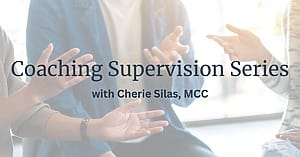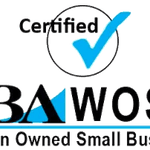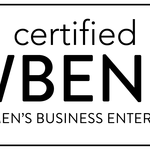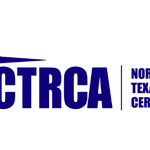“I’ve been reading about coaching for six months, but I’m stuck in analysis paralysis,” Devon typed in our ACC program’s pre-enrollment chat. “How do I actually stop researching and start becoming a coach?”
TL;DR: Becoming a certified life coach takes 90-180 days with focused action. The path includes choosing ICF-accredited training ($3,500-$14,000), completing 60+ training hours, logging 100+ practice hours, and launching your practice while still in training. Most professional life coaching training programs will offer a certification at the end. The key is starting before you feel ready – successful coaches build their practice during certification, not after.
Devon’s message resonated with me because I see this pattern weekly. Smart, capable professionals who know they want to coach but get trapped in endless research loops. They compare programs. Read reviews. Calculate ROI. Research niches. And months later? They’re still exactly where they started.
I’m Cherie Silas, and after training hundreds of coaches through our Tandem programs (with a 94% first-time pass rate on the ICF exam), I’ve noticed something: the ones who succeed aren’t the ones who plan perfectly. They’re the ones who start imperfectly and adjust as they go.
Today, I want to give you what Devon needed – not another article about why coaching matters, but a concrete 90-day roadmap to go from “thinking about it” to “certified and coaching.” If you’re still exploring whether coaching is right for you, start with our guide on how to become a life coach. But if you’re ready to act, keep reading.
The Myth of Perfect Timing
Let me share what I’ve learned about timing: there’s never a perfect moment to become a coach. You’ll never feel completely ready. Your finances won’t magically align. Your schedule won’t suddenly clear.
The coaches who thrive? They start anyway.
Take Sarah, who joined our January cohort while working full-time as an HR director. “I kept waiting for the ‘right time,'” she told me during our graduation ceremony. “Then I realized I was using perfection as procrastination.”
By April, while still in training, she had five practice clients. By June, she’d replaced half her corporate income. Today, eighteen months later, she coaches C-suite executives full-time at $400 per session.
The difference? She stopped preparing to prepare and started taking action.
Your 90-Day Transformation Roadmap
Here’s the blueprint I give every aspiring coach who’s ready to move from dreaming to doing:
Days 1-7: Make the Commitment
Stop researching. Start deciding.
The coaching industry offers more than 1000 different programs and counting. You could spend years comparing them. But here’s what matters most in your decision:
Choose ICF accreditation as your non-negotiable standard. It’s recognized globally and ensures rigorous training standards. Without it, you’re limiting your future opportunities, especially with corporate clients who increasingly require ICF credentials.
Ensure mentor coaching is included in your program investment. Many schools charge an additional $1,000-2,000 for this required component. At Tandem, we include 12 hours in our base price because we believe transparency matters.
Verify the program fits your real life. Online programs offer the flexibility working professionals need. You can find lots of life coaching courses on Udemy and other similar online learning marketplaces. Though this may seem convenient and affordable, it is not how to become a life coach. You need interactive, live components for true skill development.
Action this week:
- Schedule consultations with 3 programs maximum
- Attend one demo or info session
- Make your decision by day 7
- Pay your deposit (commitment creates momentum)
Days 8-30: Immerse and Absorb
Your training begins before class starts.
Before paying for an education, you’ve got to educate yourself. But not endlessly – strategically. Research indicates that before investing a large amount of money and 6 to 12 months of your time into getting certified, you’ll want to be absolutely sure that coaching is the ideal career path for you.
Week 2: Foundation Building
- Read one foundational coaching book (I recommend “Co-Active Coaching”)
- Listen to 3 coaching demo sessions online
- Practice active listening in every conversation
- Start journaling about your coaching philosophy
Week 3: Skill Development
- Practice asking powerful questions
- Record yourself having conversations (notice your patterns)
- Complete any pre-work from your program
- Connect with your cohort online
Week 4: Mindset Preparation
- Work with a coach yourself (experience the client side)
- Identify your limiting beliefs about coaching
- Create your learning schedule
- Set up your practice space
Days 31-60: Learn and Practice
Training isn’t passive – it’s transformation.
The training will usually take 40 – 160 hours, stretched over six to 12 months. But you don’t wait until it’s over to start coaching. Industry research shows the most successful coaches begin practicing while still in training, building experience and confidence simultaneously.
Month 2 Focus:
- Attend every live session (treat it like a client meeting)
- Practice coaching between classes
- Find 3 practice clients by week 6
- Complete 20 practice hours minimum
- Get feedback on every session
The secret? Don’t aim for perfection. Aim for practice. Every awkward session teaches you something. Every mistake builds resilience. As we explore in our article on cultivating coaching confidence, confidence comes from experience, not perfection.
Finding Practice Clients:
- Post in your program’s community
- Offer free sessions to colleagues
- Connect with other students (coach each other)
- Ask friends who’ve expressed interest
- Join local networking groups
Remember: everyone needs practice clients. Don’t apologize for being new – celebrate that you’re learning.
Days 61-90: Build While Learning
Launch before you’re ready.
This is where most aspiring coaches stall. They want to finish certification before starting their business. But the coaches who succeed? They build while they learn.
Month 3 Actions:
Week 9-10: Business Foundation
- Choose your business name
- Create simple website or landing page
- Write your coaching bio
- Design a basic service offering
- Set up payment systems
Week 11-12: Market Testing
- Announce your coaching practice
- Offer 5 discovery calls
- Create your first paid package
- Price slightly below market (for now)
- Get your first paying client
The goal isn’t perfection – it’s progress. You can refine everything later.
Days 91-180: Certify and Scale
Finish strong, then grow strong.
The second 90 days focus on completion and expansion:
Certification Completion:
- Finish required training hours
- Complete 100 practice hours
- Pass your certification exam
- Submit ICF application
- Celebrate your achievement!
Business Building:
- Raise your rates incrementally
- Develop your niche through experience
- Build referral relationships
- Create consistent marketing rhythm
- Join professional coaching organizations
The Investment Reality Check
Let’s talk numbers honestly:
Financial Investment:
- ICF-accredited programs: $3,500-$14,000
- Additional costs: $1,000-2,000 (books, ICF fees, business setup)
- Total: $5,000-16,000
For a detailed breakdown, see our ICF certification cost comparison.
Time Investment:
- Training hours: 60+ for ACC certification
- Practice hours: 100+
- Study/prep time: 50+
- Total: 200-300 hours over 6 months
ROI Timeline: According to recent industry data, coaches with credentials delivered a more satisfying experience than uncertified coaches. As discussed in our life coaching certification guide, this translates to:
- Higher rates (20-30% premium for certified coaches)
- More clients (certification builds essential trust)
- Corporate opportunities (many require ICF credentials)
- Typical payback period: 6-12 months
Our graduate Marcus shared his experience: “I invested $3,500 in Tandem’s ACC program. Within 8 months, I was earning $3,000 monthly from part-time coaching. Now, two years later, I’ve built a six-figure practice. The ROI isn’t just financial – it’s the confidence that comes from knowing you’re properly trained.”
The Real Success Factors
After watching hundreds of coaches launch through our programs, here’s what separates those who thrive from those who struggle:
1. Start Before You’re Ready
Every successful coach I know started coaching before they felt qualified. Your first sessions will be messy. That’s not failure – that’s learning. As recent data shows, becoming a certified life coach is one of the best career decisions you’ll ever make, but only if you actually start practicing.
2. Build in Public
Share your journey. Post about what you’re learning. Let people see your transformation. Your vulnerability becomes your marketing. One of our graduates, Jennifer, built her entire practice through LinkedIn posts documenting her certification journey. She had 10 clients before graduating.
3. Embrace the Business Side
Anyone with a certificate can coach a client that is sitting across the table from them. But in order to build a sustainable business that will still be around 5, 10 years from now, you’ll need the business acumen to bring your dreams to reality. Learn how to build a successful coaching practice from the start.
4. Focus on Service, Not Perfection
Your early clients don’t need you to be perfect. They need you to care, to listen, to hold space. You can do that from day one. Understanding the distinction between coaching and therapy helps you serve within your scope.
5. Use Your Background
Whatever you did before coaching isn’t irrelevant – it’s preparation. Your experiences become your unique coaching perspective. Whether you’re coming from executive leadership or another field, your past informs your coaching future.
Common Saboteurs (And How to Overcome Them)
“I need to read one more book…” You’ll learn more from one practice session than ten books. Read while you practice, not instead of practicing. Check our recommended reading list for coaches for the essentials.
“I’m not ready for paying clients…” If you wait until you feel ready, you’ll wait forever. Start with low rates and high integrity. Understanding ICF ethics gives you the confidence to serve professionally.
“I don’t know my niche yet…” If you do not have relevant experience, skills, or an interest in these areas, you won’t be successful. Your niche emerges through coaching, not thinking. Research from the International Coaching Federation shows that while career and mindset coaching are the most popular niches, the best specialization is where your passion meets market demand. Learn about different coaching specialties to see what resonates.
“The market is saturated…” The coaching industry is growing rapidly. There’s room for coaches who do the work and serve authentically.
“I can’t afford certification…” Many programs offer payment plans. Some coaches fund certification with practice client income. Where there’s commitment, there’s a way.
Your Week-by-Week Action Plan
Week 1: Commit
- Research 3 ICF programs maximum
- Attend one info session
- Make your decision
- Pay deposit
Week 2-4: Prepare
- Read one coaching book
- Practice coaching conversations
- Join program community
- Set up learning schedule
Week 5-8: Immerse
- Start formal training
- Find practice clients
- Complete first 20 hours
- Get mentor feedback
Week 9-12: Build
- Create business foundation
- Announce your practice
- Conduct discovery calls
- Sign first paying client
Week 13-24: Scale
- Complete certification requirements
- Refine your offerings
- Build referral network
- Establish marketing rhythm
The Uncomfortable Truth About Success
Here’s what no one tells you: becoming a certified life coach is 20% learning techniques and 80% becoming who you need to be.
The certification process will challenge you. You’ll confront your own limitations. You’ll question whether you’re good enough. You’ll have sessions that flop.
Good. That’s the work.
Because when you transform yourself, you become capable of facilitating transformation in others. The credential is just proof you did the work.
Making the Choice That Changes Everything
As I write this, Devon – who sent that message about analysis paralysis – is graduating from our program. Last week, she told me, “I spent six months researching and made zero progress. Then I spent six months in your program and built a practice with 12 regular clients.”
The difference? She stopped preparing to become a coach and started becoming one.
Certification Path Comparison
Not sure which path to take? Here’s how the options stack up:
| Factor | ICF-Accredited (Tandem) | Non-ICF Programs | No Certification |
|---|---|---|---|
| Investment | $3,500-$14,000 | $995-$5,000 | $0-500 (books) |
| Timeline | 6-9 months | 3 days-3 months | Immediate |
| Market Recognition | High – global standard | Limited | None |
| Corporate Access | Yes | Rarely | No |
| Average Hourly Rate | $150-$500 | $75-$200 | $50-$150 |
| ROI Timeline | 6-12 months | 12-24 months | Uncertain |
| Ongoing Support | Strong community | Varies | None |
| Ethics Training | Comprehensive | Limited | None |
The data is clear: while non-ICF programs seem attractive due to lower costs, the long-term earning potential and credibility of ICF certification provide superior ROI.
Your clients are waiting. Not for the perfect coach, but for someone who cares enough to show up, learn, and serve. Someone who’s willing to be imperfect in service of their growth.
That someone could be you. But only if you stop reading about coaching and start doing it.
Your Next 24 Hours
If you’re serious about becoming a certified life coach, here’s what to do in the next 24 hours:
- Choose your path: Schedule a consultation with an ICF program (yes, including ours)
- Take inventory: List your transferable skills and experiences
- Find accountability: Tell someone about your 90-day plan
- Start practicing: Have one coaching conversation today
Remember: You FEEL a PASSION to make an impact in the world through coaching. That passion is your qualification. The certification is just the structure that helps you deliver it professionally.
The question isn’t whether you can become a certified life coach. You can. The question is: will you start today, or will you still be researching six months from now?
Your future clients – the ones whose lives you’re meant to change – are hoping you choose action.
Ready to stop researching and start becoming? Explore our ACC certification program and join coaches who choose progress over perfection.
P.S. Devon asked me to share this: “If you’re stuck researching like I was, just pick a program and start. You’ll learn more in your first week of training than in months of analysis. Your future self will thank you for starting imperfectly.”
Frequently Asked Questions
How quickly can I realistically get certified?
The fastest path is 3-6 months for ACC certification. Training typically takes 40 – 160 hours stretched over six to 12 months. However, rushing isn’t recommended. Most working professionals complete certification in 6-9 months, which allows time to integrate learning while maintaining life balance. Remember: it’s not a race. Quality transformation takes time. Learn more about the ICF ACC credential exam requirements.
Can I start coaching clients before I'm certified?
Absolutely! In fact, you must. ICF certification requires 100+ hours of coaching experience. Start with practice clients (free or discounted) while in training. Be transparent about your student status, and you’ll find plenty of people happy to support your journey while receiving valuable coaching. Most successful coaches sign their first paying clients before graduating. Understanding actions and accountability helps you serve clients effectively from day one.
What if I choose the wrong certification program?
First, with ICF accreditation, it’s hard to go completely wrong. These programs meet rigorous standards. Second, no program is perfect for everyone. Focus on fit: learning style, schedule, budget, and values alignment. If you do your due diligence (attend info sessions, talk to graduates), you’ll likely choose well. Trust your instincts – they’re usually right. Compare programs in our guide to the best life coach certification programs.
How do I find clients while still working full-time?
Start with your network. Offer evening or weekend sessions. Use lunch hours for virtual coaching. Many successful coaches built their practice while employed by coaching early mornings, evenings, and weekends. Focus on 5-10 clients initially. As income grows, you can transition gradually. Remember: most of our students keep their day jobs during certification. Learn strategies for building trust with coaching clients.
Is the coaching market too saturated for new coaches?
No. While there are more than 109,200 certified coaches worldwide, the demand for quality coaches continues growing. The key is differentiation through your unique background, specific niche, and authentic approach. Saturation is a mindset issue, not a market reality. There are billions of people; you only need 20-30 clients to build a thriving practice. In fact, 68% of individuals who hired coaches were able to make back their investment, showing strong market demand.
What if I invest in certification and then realize coaching isn't for me?
This is rare but possible. That’s why experiencing coaching (as a client) and having practice conversations before enrolling is crucial. Even if you don’t build a coaching practice, the skills – listening, questioning, facilitating growth – enhance any career. Many use coaching certification to become better leaders, consultants, or therapists. The personal growth alone is valuable. Understanding ICF core competencies benefits any professional role.
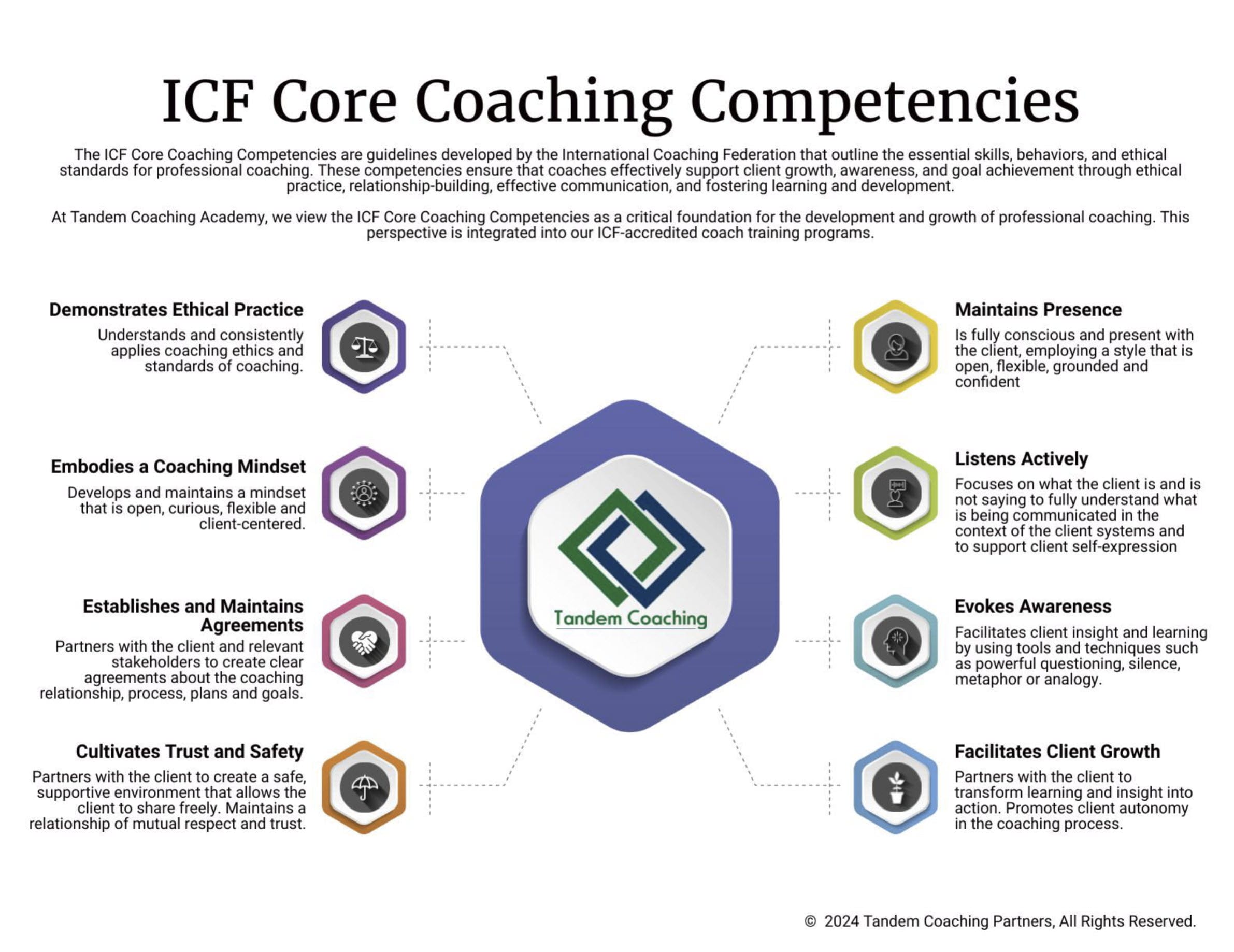
Unlock Your Coaching Potential with Tandem!
Dive into the essence of effective coaching with our exclusive brochure, meticulously crafted to help you master the ICF Core Coaching Competencies.
"*" indicates required fields
About the Author
Cherie Silas, MCC
She has over 20 years of experience as a corporate leader and uses that background to partner with business executives and their leadership teams to identify and solve their most challenging people, process, and business problems in measurable ways.


